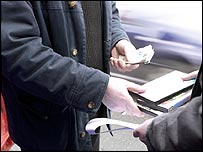The UK film industry has launched its strongest ever campaign to combat DVD piracy. BBC News Online looks at who is behind the rising trade - and whether it is a "victimless crime".

DVD piracy is said to be worth $3bn in the US and £500m in the UK
|
What is DVD piracy?
There is a healthy global black market in unofficial copies of popular films being sold without the permission of film-makers and with no money going to the official rights owners. These usually go on sale before the film has had its official DVD release, and often before it has even come out at cinemas in some countries.
How are copies made?
The crudest and most common method is to film a movie from the audience with a camcorder during an early screening. Some camcorders are even placed in projection booths, with a direct sound input from the projector. Copies can also be made by film workers or others who have advance access to the movie. These are often made in the US, where a film is usually released first, and distributed around the world within days.
What is the quality like?
It varies widely and there is no way of knowing when you buy one. It could be a near immaculate version from an inside job - or a wobbly, inaudible copy made by someone sitting with a camcorder.
How are they sold?
In the UK, they are often sold for £5 each by hawkers on high streets or at about 7,000 car boot sales and markets. Sellers also take their wares around pubs, offices and homes. Pirate DVDs can appear for sale on internet sites such as eBay and Internet Relay Chat services - private clubs where members have to be invited to join.
Who buys them?
A lot of people, according to the film industry - which estimates it loses up to £500m per year in the UK and $3bn (£1.6bn) in the US through DVD piracy. Film fans are attracted by the low prices and the fact that movies are available so early. In the UK, authorities say most people who buy pirate DVDs see it as a "victimless crime" that does not really hurt anyone - apart from film companies, who some think can afford to lose a small part of their profits.
Is it a victimless crime?
Not according to UK authorities, who say DVD piracy is a lucrative part of a wider network that involves criminal gangs, drug dealers, people smugglers, paedophile rings and even terrorists. They say it is an easy way for gangs to raise funds for their other criminal activities. Gangs can earn 10 euros (£6.65) for each euro invested in piracy, and a kilogram (35 ounces) of pirate DVDs is worth more than a kilogram of cannabis resin, according to authorities.
Do pirate DVDs fund al-Qaeda?
The authorities are a bit vague on this one - they say terrorist groups do sell DVDs in the UK and take the profits out of the country to fund their activities, but are wary of giving specific information. In the UK, police do say paramilitary groups sell 80% of counterfeit goods in Northern Ireland. And in 2003, Interpol warned that counterfeiting was becoming "the preferred method of funding for a number of terrorist groups" and there were enough examples "for us to worry about the threat to public safety".
What can be done to stop DVD piracy?
The film industry is currently carrying out a two-pronged attack - on the sellers and the customers. In the UK, raids on DVD pirates were up 405% in 2003 compared with 2002 and have continued rising this year. The industry is also using cinema trailers, posters and other methods to get its message across to film fans. A phone hotline in the UK has been set up to report pirate DVDs being sold - it is 0845 6034567.

